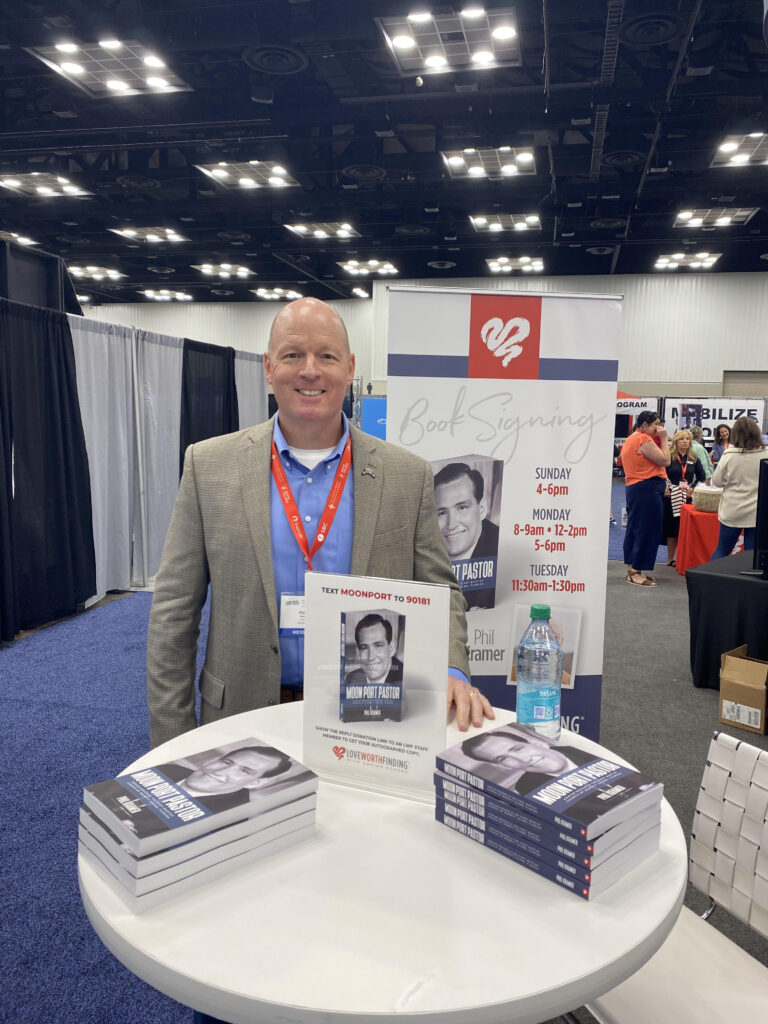
MERRITT ISLAND, Fla. – A dozen or so miles from NASA’s launch pads at Cape Canaveral, a new pastor – Adrian Rogers – asserted in a sermon, “God has given us a golden opportunity” that “very few people get to see.”
Arriving in Merritt Island, Fla., in 1964 amid America’s race to the moon, Rogers told First Baptist Church, founded 15 years earlier, “This church cannot be a normal church.

“It should be large and strong. It should be attractive and exciting. It should be abreast of the times and in many respects compare favorably with the dynamic spirit of this area and age.”
Even so: First Baptist Merritt Island “must be true to the pure Gospel,” Rogers, then 32, declared in the church newsletter. “We must unashamedly proclaim the Old Book, the New Birth, the Precious Blood and the Blessed Hope.”
Rogers’ eight years at First Baptist – until he was called to the Memphis-area Bellevue Baptist Church in 1972 – are the focus of “Moon Port Pastor,” a new book by Phil Kramer, an Arkansas pastor and Florida native. The title stems from how Rogers typically was introduced as a popular conference speaker in the 1970s – with Merritt Island situated at the center of Brevard County, known as “Moon Port USA,” the hub of NASA’s – and America’s – lunar ambitions.
‘Labor of love’
Kramer first heard Rogers’ preaching on cassette tape as a high school senior and new believer in 1991 while accompanying his pastor to and from a chapel address at the Baptist College of Florida.
“You need to listen to this guy,” the pastor, Guy Sanders, told Kramer on the three-hour return trip.
They listened to several sermons, but “I was such a new Christian that I was focused more on spending time with my pastor than listening to the messages. However, I do remember occasionally stopping the tape to ask my pastor a question about something Adrian was saying.”
Kramer enlisted in the Marines after high school. While stationed at Camp David, Maryland, the 19-year-old first heard Rogers’ national radio broadcast Love Worth Finding.
“This is the guy I listened to with my pastor!” he realized.
“At that point, I was hooked. I began buying cassette tape albums and couldn’t get enough,” Kramer recounted via email interviews.
“I still have all of those cassette albums to this day. Even though they are totally obsolete, the packaging reminds me of the days in my early Christian life when I was growing by leaps and bounds largely because of Adrian Rogers’ preaching. I had been saved at age 17, but having grown up Catholic, I didn’t know anything about the Bible. So during those four years in the Marines, God used his preaching to make up for lost time.”
A fellow Marine once glanced over his shoulder at his Visa statement and quipped, “Fifty dollars to Love Worth Finding? Kramer, what kind of stuff are you buying?”
Shortly after Rogers’ death in November 2005 at age 74, Kramer read the book by Rogers’ wife Joyce, “Love Worth Finding,” on their lives together, their 30-plus years at Bellevue and their endeavors within the Southern Baptist Convention – and he began to sense that more could be told about Rogers’ eight years at Merritt Island.
It became “a labor of love,” with Kramer intent on “a healthy level of documented detail necessary for true historical work” in a book that also aimed to be “accessible and inspiring for pastors and church members alike.”
Kramer – then an Army chaplain in 2008 – traveled to Florida to interview a number of people who had been part of Rogers’ ministry at First Baptist. In 2012, Kramer’s wife Shara gifted him with a collection of 400 of Rogers’ Merritt Island sermons, and he subsequently listened to each at least twice. Several years later, spending an afternoon with Joyce Rogers and her daughters Gayle and Janice, they shared several scrapbooks from the family’s Merritt Island years. And Kramer reviewed Rogers’ files along with information from the Florida Baptist Convention’s archives.
He also searched archived newspapers to add key NASA milestones – capped by the Apollo moon landing – alongside Rogers’ First Baptist ministry.
The result, despite numerous deployments to Iraq and Afghanistan, is a 319-page book with 542 footnotes published by Rogers’ ongoing Love Worth Finding ministry
‘Culture of evangelism’
In Rogers’ passion for lost souls, Kramer writes that “relentless personal evangelism was a priority that drove nearly every aspect of life and ministry” at First Baptist. “(Through) both his example and teaching, he developed a comprehensive culture of evangelism … that transcended any program, sermon series, or campaign.”
Special events and multi-day revival meetings with noted speakers were part of Rogers’ soul-winning mix. The night before Apollo 11 lifted off in July 1969 to carry Neil Armstrong and Buzz Aldrin to the moon, First Baptist invited the community and visitors to a “Moon Island Pre-Departure Rally” with music and watermelon – and prayer. A special edition of the church newsletter The Thrust was distributed, with Campus Crusade’s “Four Spiritual Laws” on the cover.
The church held an open house after the launch and provided refreshments. “Moon Chips” were on the menu for that evening’s dinner and Wednesday prayer meeting, and Rogers preached on “What the Bible Says About Man Going to the Moon.”
In his Sunday sermon hours before the lunar landing, Rogers noted, “As you see these things taking place on television later today, I want you to look beyond the glory of the stars … to the glory of the Lord Jesus.” He then quoted the hymn “Beautiful Savior”:
“Fair is the sunshine
Fairer still the moonlight,
And all the stars in the heavenly host;
Jesus shines brighter,
Jesus shines purer,
Than all the angels heav’n can boast.”
Rogers often watched NASA liftoffs from the VIP stands as the guest of engineers who were First Baptist members. At other times, he and his wife would call their children – Steve, Gayle, David and Janice – to the backyard, with Steve recollecting in the book, “My parents never lost the awe and wonder of the space program. As we rushed out to watch a launch, the ground shook.”
“There’s just something about the launching of a missile,” Rogers pondered in a sermon, “and the second coming of Jesus Christ that go hand-in-hand in my heart. … Never forget that it’s not who’s going up but who’s coming down that will change the history of this world.”
Hospitals, supermarkets and roads
With President Kennedy’s call to go to the moon in 1961, Brevard County experienced an influx of NASA and other space industry personnel in the multiple thousands. For Rogers, reaching the lost entailed more than preaching as he led First Baptist in a $1.3 million expansion of its facilities in the mid-‘60s – $12 million in today’s dollars – to serve families struggling with high-pressure jobs, long hours and marital tensions.
“The hospitals say they will greatly expand to care for men’s bodies. Will we neglect their souls?” Rogers wrote in the church newsletter. “The supermarkets are springing up to provide food. Are we making adequate preparation to distribute the Bread of Life? Roads and bridges are being constructed to facilitate travel. Are we ready to teach about Christ, God’s Bridge from Sin to Salvation, and the only road to Heaven?
“Dear People, will you join me in a venture of faith for Jesus? Let’s not let the people of the world show more faith than the people of God.”
The two-phased project, bond-financed by church members, included a 15-classroom children’s building and a Family Activities Building with a gymnasium, commercial kitchen for serving dinner to some 600 people, a music suite and library, four-lane bowling alley, snack bar, and space for weight lifting and a sauna, games and ceramics. The auditorium’s capacity, meanwhile, was expanded from 800 to 1,350, including an overflow area.
During Rogers’ eight years at Merritt Island, Sunday attendance grew from 300 to 2,000 and 2,400 people were baptized. After he moved from First Baptist to Bellevue, another 250 people were baptized during the church’s 14-month search for a new pastor.
‘Spirit-filled life’
Rogers regularly attributed his evangelistic zeal to the Holy Spirit, declaring, for instance, “I want more than anything else for the power of God to rest upon my life. I’d rather die than preach without the anointing of the Holy Ghost.”
The command to be filled with the Spirit, he taught, is “not just to the song leader and not just to the pastor, but to every one of us … to be in a continual state of possession and control by the Spirit. a constant state of saying, ‘Yes, Lord, what do you want me to do?’”
Rogers spoke of his own journey toward the Spirit-filled life, recounting in a sermon, “Either when I was a young Christian I was deaf, or preachers did not preach the fullness of the Spirit. I never heard it.
“I was born again in a Southern Baptist church, went to a Southern Baptist college, went to a Southern Baptist seminary, and yet I was out and preaching for about five years before I understood how to be filled with the Spirit – that God does not want me to do anything for Him; rather, he wants to do something in and through me.”
Kramer, now lead pastor of Crossgate Church in Hot Springs, Ark., had a similar takeaway in writing Moon Port Pastor. When he received Jesus Christ as Lord and Savior, “not only did I not hear about the Spirit-filled life, I learned to be suspicious of anyone giving more than lip service to the Holy Spirit lest I become entangled in Pentecostal theology.
“How sad,” Kramer lamented, “that many Southern Baptists have missed out on the Biblically-based fullness of the Holy Spirit that gives power for living the Christian life and boldness in sharing the Gospel with a lost and dying world. … If denominational decline is any indication, I would argue that today’s Southern Baptist Convention could use a good, stiff dose of the fullness of the Holy Spirit.”
Amplifications of the Spirit-filled life by two individuals, Major Ian Thomas and Bertha Smith, resonated with Rogers – Thomas, a former British military officer who wrote “The Saving Life of Christ,” and Smith, a missionary to China who witnessed the sweeping 10-year “Shantung Revival” that began in 1927.
Both Thomas and Smith led weeklong conferences at First Baptist.
In listening to Rogers’ Merritt Island sermons and reading through the church’s newsletter, Kramer observed, “I was surprised to hear/read how often he spoke of the Holy Spirit, the Spirit-filled life and the fullness of the Holy Spirit,” likely birthed when Rogers as a young believer, alone is his high school’s football practice field one night, laid prostrate and cried out for God to use him. “I knew no theology about the Holy Spirit. But God moved into my life. … There was just that plus, that difference.”
Some church members kindly needled their pastor by saying, “Brother Rogers, sometimes you sound like someone from another denomination.”
‘Earnestly contend’
Sound doctrine anchored Rogers’ soul-winning and his embrace of the Holy Spirit, dating back to the “disquietude” he felt as a college student at Florida’s Stetson University when various professors at the Baptist school taught that Satan was only a “personification” of evil and discounted the authors of the Gospels as well as Moses of the first five books of the Old Testament.
After one sociology class, Rogers queried the professor: “Sir, I don’t want to be impertinent, but I want to ask you a question: Are you saved? … If you were to die right now, would you go to heaven or hell?” The professor replied, “I don’t know if there is a heaven or a hell; I’ve never been to either one.”
The encounter left Rogers with a troubling thought: “If some church people knew that they were paying this man’s salary to teach in a Baptist school, they would be deeply grieved.”
In subsequent years, he was among messengers at the Florida Baptist Convention and Southern Baptist Convention annual meetings concerned over theological liberalism, espoused, for example, in a 1969 Broadman Bible Commentary volume on Genesis and Exodus published by the SBC’s then-Sunday School Board.
Rogers called the commentary “a disgrace to Almighty God.”
“The same sin that led the Methodists down the wrong trail and led the Presbyterians down the wrong trail … is trying to wreck the Southern Baptist Convention,” he warned in a sermon at First Baptist.
“God help us if we don’t stand up against it and say that the Bible is the inspired Word of God,” he said, reflecting the stance he maintained when elected as SBC president in 1979 and 1986-1987.
Rogers’ convictions about Scripture, however, were accompanied by graciousness.
“Earnestly contend for the faith,” he exhorted in a sermon. “But as you contend, don’t become contentious. Take a stand but keep yourself sweet.
“So many people, wanting to stay true to the Bible and true to the faith, get a nasty, bitter spirit,” he said. “We are to believe and behave. There are a lot of people who believe right but they don’t behave right – they are overly narrow, bitter and critical. … It’s possible to have a warm nose sniffing out heresy but a cold, loveless heart.”
Son’s assessment
Rogers’ oldest son Steve relayed three descriptions – all alliterated “in true Adrian Rogers fashion” – of Kramer’s book: “informative,” “interesting” and “inspirational.”
“It is obvious that Phil Kramer has done due diligence in his comprehensive research” to make the book informative, Steve Rogers said via email, “by not just relying on one or two sources, but by sharing the insights and remembrances of a broad range of the people who were directly connected to my dad and his ministry at Merritt Island.”
“Although, as a child and teen, I was there through the entire story, Moon Port Pastor is filled with details that I either had forgotten or never had paid attention to.”
The book is interesting, he said, because it is “more than just a compendium of names, places and dates. Phil Kramer has done a great job in crafting all of his research into a compelling story. I especially like the way he has interwoven the backstory of the history of NASA and the space program into the book.”
From an inspirational standpoint, Steve Rogers noted, “Phil Kramer has also endeavored to give the reader an insight into the man himself: his ‘100% sold-out’ devotion to God, his unflinching commitment to the authority of the Word of God, and his character qualities – holiness, leadership, genuineness, authenticity and humility – to name a few.”
–30—
Rogers at typewriter
Adrian Rogers, in leading First Baptist Church in Merritt Island, Fla., from 1964-1972, regularly set forth his vision in the church newsletter, The Thrust, for evangelistic ministry amid NASA’s – and America’s – race to the moon. Photo submitted.
Phil Kramer
Arkansas pastor and former Army chaplain Phil Kramer has capped more than 20 years of research into a new book about Adrian Rogers, “Moon Port Pastor,” which debuted among Southern Baptists at the SBC Annual Meeting in June in Indianapolis. Photo submitted














